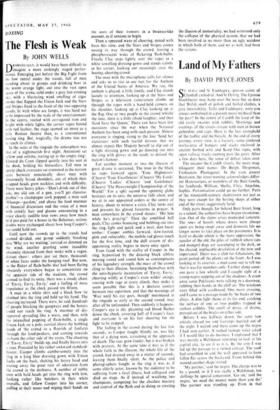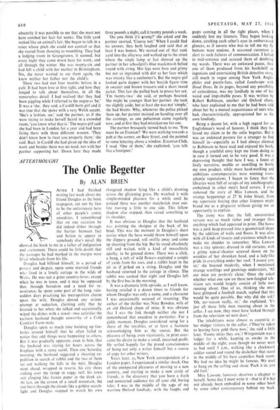Land of My Fathers
By DAVID PRYCE-JONES
ST TULO and St Euddogwy, patron saints of Llandaff cathedral. And St Dyfrig. The Epstein blockbuster may hang over the nave but so does that Welsh smell of polish and boiled clothes, a grey inevitability. Teilo and Euddogwy, were you always embalmed in a present more mythical than the past? In the centre of Cardiff the keep of the old castle swarms with rabbits. Mornings and evenings all the streets stream with men in brown gaberdine and caps. Here is the last stronghold of the trolley and the bicycle. At the end of every journey, every view, is a factory, some cindered works-area of hangars and stacks enclosed in ancient barbed wire and Keep Out signs, with open railway tracks running past the gates. After a few days here, the sense of defeat takes over.
The meaner the Cardiff streets, the more mag- niloquent their names De Burgh, Despenser, Fitzhamon, Plantagenet. In the even poorer Butetown, the street-naming acknowledges differ- ent Hanoverians, or members of the Bute family, the landlords, William, Sheila, Eliza, Angelina, Sophia. Patronisation could go no further. Parts of the nineteenth-century shantytown are just as they were except for the betting shops at either end of the street, suggestively lurid.
Only parts though, for behind Bute Street, long as a tunnel, the authorities have begun reconstruc- tion. Out of the slums arises municipal concrete. The rows of hovels whose doors were always open are being swept away and domestic life no longer seems to take place on the pavements. It is hard to decide which is the more oppressive, the squalor of the old, the piles of rubbish where cats and mongrel dogs are scavenging in the dark, or the cleared, implacable desolation of the new and impersonal. There was a club for Ghanaians, the paint peeled off the planks on the front. As I was looking at its exterior, a man came out to tell me that it was for members only. Farther along some- one gave a low whistle and I caught sight of a young negro stepping out of the shadows. A street away some Pakistanis were talking in a doorway, rubbing their hands in the chill air. The windows were filled with cardboard. One more crossing, and I came to a passage made by the backs of two alleys. A dim light shone at its far end, catching the surface of one or two puddles trapped in sunken cobbles. The smell of decay, of drains, pressed out of the bricks on either side.
Before I was halfway down. the same low whistle chased me and footsteps hurried out of the night. I waited and there came up the negro I had seen earlier. A rushed teenage voice asked if I would like to do business. I explained that I was merely a Welshman returning to look at his capital city, to see it as it is. By the arm I was led up the passage to a ruined cottage. The roof had crumbled in and the wall appeared to have fallen flat across the backyard. From behind this mound another shape stirred.
'My partner,' said the negro. The charge was to be a pound, or if I was really a Welshman, ten shillings by special concession. `Go on,' said the negro, 'we need the money more than you do:' The partner was standing up. Even in that obscurity it was possible to see that she must not have combed her hair for weeks. The little yard reeked like an animal's lair. She began to talk in a voice whose pitch she could not control so that she veered from shouting to mumbling. They had a lodging room in Grangetown, it seemed, but every night they came down here for work, and all through the winter. She was twenty-six and had left a child with her mother in Birmingham. No, she never wanted to see them again, she knew neither her father nor the child's.
These two had met four months before in a café. It had been love at first sight, and how they longed to talk about themselves, in all the remorseless detail. I had realised that they had been giggling while I referred to the negro as 'he.' It was a 'she, they said, a Cardiff-born girl and it was true that she spoke with a very Welsh accent. 'She's a lesbian, see,' said the partner, as if she were trying to make herself heard in a crowded room, 'you know what that is.' The negro girl said she had been in London for a year and had been living there with three different women. 'They don't know how to treat you properly there,' she said. Back in Cardiff she had given up the idea of work and besides there was no need, not with her partner supporting her. Down here they made three pounds a night, call it twenty pounds a week.
'Do you think it's wrong?' she asked and the partner snorted, 'Course not.' When I could find no answer, they both laughed and said that at least I was honest. We moved out of that rank yard into the alleyway and walked up to the street where the single lamp at last showed up the partner in her schoolgirl's blue mackintosh belted round with string. Her legs were bare and grimy but not so ingrained with dirt as her face which was streaky like a coalminer's. But the negro girl looked quite dapper with her boyish figure trim in sweater and brown trousers and a short tweed jacket. This last she pulled back to prove her sex. 'I'm twenty-two,' she said, or perhaps boasted. She might be younger than her partner; she took me slightly aside, but at least she was not 'simple,' she had brains. Why, whenever the police picked them up, her partner insisted on handing over all the earnings, so one policeman came regularly now, and at first they had mistaken me for one.
The partner brusquely turned back to me. 'You must be an Etonian?' We were walking towards a pub at the corner, on Bute Street, and she pointed to some lettering above a window. Estonian Club, I read. 'One of them,' she explained, 'you talk like a foreigner.'



































 Previous page
Previous page